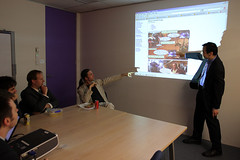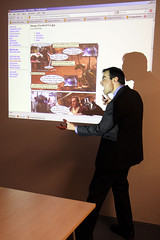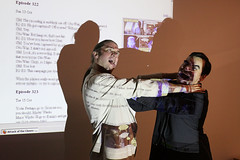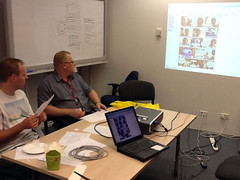

| Archive Blog Cast Forum RSS Books! Poll Results About Search Fan Art Podcast More Stuff Random |
|
Classic comic reruns every day
|
1 {photo of an ancient Egyptian stone with hieroglyphyic writing carved on it}
1 Caption: Writing together
|
First (1) | Previous (3217) | Next (3219) || Latest Rerun (2889) |
Latest New (5380) First 5 | Previous 5 | Next 5 | Latest 5 Annotations theme: First | Previous | Next | Latest || First 5 | Previous 5 | Next 5 | Latest 5 This strip's permanent URL: http://www.irregularwebcomic.net/3218.html
Annotations off: turn on
Annotations on: turn off
|
 The Darths & Droids writing team. |
I'm not going to pretend to be an expert on writing, but there's a particular field of writing in which I have some experience and which may be interesting to some of you. I've written a lot of comic scripts. These are short pieces of comedic fiction, which often string together to make a more or less coherent story.
I've talked a bit before about how I wrote Irregular Webcomic! At first it was an irregular (ha!) process, but over the years I honed it into a routine. I have about a half hour train ride in to work every weekday morning (it used to be a 45 minute bus ride, until the new rail line opened in 2006), and I took a notepad and pen. That time was my thinking and writing time. I'd scrawl down comic ideas, usually fleshed out as complete scripts of dialogue. Hopefully by the end of the working week I'd have at least eight new scripts, which was the number of comics I'd typically photograph and assemble on the weekend - a week's worth plus an extra one to increase the buffer size. Some weeks I'd write more, some weeks I'd struggle and write fewer, letting the excess scripts from prior weeks take up the slack.
I maintained (and still have) an ideas file, into which went loose gag ideas and script snippets that didn't work with my current storyline. That's also where the many reader suggestions for strips went. Occasionally I'd trawl through the ideas file for inspiration and pull pieces out for use. Over the years I used many reader suggestions, but about 90% of them are still in the ideas file, so don't feel bad if I never got around to using yours[1].
 Reviewing a strip. |
Darths & Droids is very different. I write it with a group of friends, during one lunch break a week at work. Ideas often come at other times, in which case we record them on a shared document system - we use both a wiki and Google Docs. We discuss ideas over e-mail and in person, and record the outcomes. Then during the writing session we use a projector to display a document on the wall as we discuss further, argue, and write.
The arguing is an important part of the process. When you write something by yourself, there's no input from people who disagree with you. When you write in a group, you get the benefit of more ideas, and the benefit of people disagreeing. The disagreements help the end result because it means that no idea, no snippet of dialogue, can get into the final product without being scrutinised, challenged, and ultimately either justified or rejected. It's a check on consistency and continuity of story, characterisation, and style.
 A difference of opinion. |
Some of our arguments get a bit heated. But not often. This is usually the result of one of us having a very good reason for wanting to do something one way, and not being able to explain that reason well enough to convince the rest of the group. When this happens and we reach stalemate, the best thing to do is go off and do something else for a while, so we can cool down.
When we return, we either have a way to explain our reasons, or we realise that we don't really have a reason other than "I just want it that way". And we recognise that that in itself isn't enough. If the other person has a reason in terms of plotting or story or characterisation, that trumps it. We compromise. But it's not a compromise in the sense that neither of us gets what we want. It's a compromise in the sense that we all understand the other person's position and that there is a strong reason behind what we eventually agree to do.
 Calmly presenting a justification. |
This process of active tension, argument, justification, and compromise brings to my mind what it must be like to be in that other great example of a collaborative creative enterprise, the band. I think I have a better understanding now of how the Beatles (for example) managed to produce such innovative and influential music, and also of why they eventually split up. At some point the necessary compromises must have became too difficult as the band members started to make and defend their creative justifications more vigorously. Perhaps because they were all coming up with stuff that could be defended well. For the first time I think I really understand the oft-cited concept of "artistic differences".
Our comic writing group doesn't seem to be in any danger of breaking up any time soon, thankfully. We've discussed our writing process at this meta level and made interesting observations about what works for us and why it works. We need the creative tension in order to pull the best contributions out of everybody, and then identify from amongst all the ideas what really are the best ones, to snap them into place. This is the process: pulling and stretching our boundaries, then letting them snap back. As long as we don't pull past the breaking point, it works.
Writing the scripts isn't the end of the creative process. The next step is assembling the comics. In both cases, Irregular Webcomic! and Darths & Droids, this is a solitary affair, done by a single person at a computer using a graphics editor. Early on, the load of creating the Darths strips was shared around, but nowadays I pretty much do all of them. (That's not a problem - I like doing them.) While assembling the strips, creative decisions need to be made about what images to use and how to do the layout. Sometimes that drives tweaks to the dialogue, and sometimes I just think of changes that I think improve it. If I make changes like these at assembly, I discuss them with the co-writers to make sure nobody disapproves.
 Reaching a compromise. |
Lest I be seen to be criticising Mr Shellshear's approach to our writing, I've recognised over time that it is motivated by the desire to explore the characters and their motivations, and to make sure that at least some of that is revealed to the readers. He wants to know the state of mind of the characters and to make that apparent in the dialogue. My approach is usually to just assume that readers can figure that stuff out - I don't like to explain too much. Sometimes he pulls me forward and says, "The readers will have no idea what's going on here. We need to slow it down and make it clearer." And sometimes I pull him back and say, "This is too explicit. We're telling the readers what the characters are thinking, rather than letting it come through naturally." And this is where the justification and compromise comes in - sometimes we go one way, sometimes the other. But in each case, we now understand why we've made that decision.
 A less formal writing session. ;-) |
Many of you reading this are no doubt aspiring writers to some degree. Maybe you write fan-fics, participate in NaNoWriMo, or have your own webcomic. Maybe you just have a dream to write something one day when you find the time. Here's an idea: Assemble a group of friends and make some time together. You probably already do this for other reasons: to have parties, to play games, to eat lunch, just to hang out. Now dedicate that time to writing something as a group. It doesn't have to be too ambitious. Start with a single short story of some sort: a 30-second film script, a comic strip, a comedy sketch. Just do it together. Throw out ideas, record them, modify them, argue over them, justify them, compromise. Do this with friends you can trust not to get mad at one another. State up front that disagreement is okay, but anyone who raises their voice has to leave for 10 minutes. See what you come up with.
By the end of it, hopefully you'll have something worth producing, and an idea of how group writing might work for you.
Meeting Hitler's brain:
Wow, this is a jarring experience.
He's certainly in a glass by himself.
|
LEGO® is a registered trademark of the LEGO Group of companies,
which does not sponsor, authorise, or endorse this site. This material is presented in accordance with the LEGO® Fair Play Guidelines. |